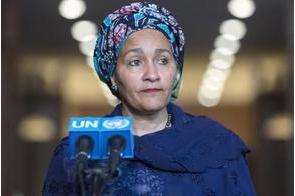Access Bank, other stakeholders facilitate SDG data analytics in Nigeria

Summary
Access Bank pioneered sustainability reporting in the Nigerian financial sector in 2009, using the GRI Standards.
Data plays a crucial role in the implementation of the 17 Sustainable Development Goals (SDGs). Without data, progress towards meeting the 2030 Agenda for Sustainable Development would be unknown. The SDGs are imbued with targets and indicators for benchmarking progress within countries with respect to every dimension of development, including ending poverty and hunger, and ensuring no one is left behind.
For effective SDG action, countries are expected to have the requisite statistical capacity for data collection, organisation, storage and analysis. This is necessary for identifying trends, monitoring and reporting progress, as well as understanding the overall state of SDG and the financing requirements for meeting the goals.
Africa is not only one of the world regions with the worst development indices. The continent is also faced with the burden of data poverty. Most African countries lack adequate statistical capacity and data governance frameworks for ensuring the accessibility and usability of transparent development data. As Africa makes efforts to achieve key SDGs such as poverty reduction, hunger elimination, universal health coverage, quality education and broader energy access, the continent needs to boost capacity on data analysis and analytics to produce and use better data on sustainable development.
Recognising their responsibilities to people and the planet, more businesses are aligning the SDGs with their corporate strategies to tap into new business opportunities and manage risks. Given these imperatives, businesses have a key role to play in terms of effective SDG data management.
In this regard, EY Nigeria and the University of Edinburgh, United Kingdom, organised a three-day workshop in February and March to help boost data analytics capacity in Nigeria for the purpose of driving progress towards the SDGs. The workshop brought together participants from across the public, private and social sectors as well as development institutions.
Access Bank Plc was invited to make a presentation at the virtual workshop, themed "SDGS Data Management for Enhanced Corporate Sustainability Performance." The bank has long demonstrated its commitment to promoting sustainable socio-economic development in Nigeria by aligning its strategies and operations with the SDGs. Access Bank's participation at the workshop provided the bank another opportunity to showcase its track record of implementing, documenting and reporting its SDG actions and their impact.
Representing the bank on day one of the workshop, which held on February 25, was Head of Sustainability at Access Bank, Omobolanle Victor-Laniyan, who spoke on the bank’s practice and framework for measuring and reporting its impact. “At Access Bank, sustainability is viewed as the only approach to doing business,” Victor-Laniyan said during her presentation. “We identify and showcase our impacts as they are crucial for reporting to our valued stakeholders.”
Access Bank pioneered sustainability reporting in the Nigerian financial sector in 2009, using the Global Reporting Initiative (GRI) Standards. In 2020, the bank was granted sustainability certification by the European Organisation for Sustainable Development (EOSD) under its Sustainability Standards and Certification Initiative (SSCI). Access Bank was the first African commercial bank to become a sustainability-certified financial institution.
The certification programme was designed for financial institutions that are driven by values, strongly committed to true and holistic sustainability and demonstrate the capacity of fulfilling the rigorous criteria of becoming sustainability certified.
Participants at the workshop on SDG data analytics discussed current efforts and challenges to implement the goals in Nigeria. They also provided insights on how businesses can enhance their sustainability performance and advised on the creation of a multi-stakeholder initiatives to mainstream SDG data analytics in the country.
The discussions at the workshop were co-led by Chair of Business and Sustainable Development, and Director for Scaling Business in Africa (SBIA) at the University of Edinburgh Business School, Kenneth Amaeshi; and Partner at EY, West Africa, Samuel Agbevem.
Financial Nigeria reporting
Related
-
UN says COVID-19 recovery efforts should accelerate SDG actions
The UN said the world was off track in achieving the SDGs even before the COVID-19 crisis erupted.
-
Sustainability stock-taking for individual and corporates
Before getting into the Yuletide season, it is important to check-up on your individual or corporate financial and physical ...
-
UNDP unveils a new development blueprint for the 21st century
The plan identifies six “signature solutions” against which UNDP will now align its resource and expertise, to ...








